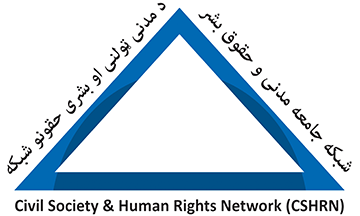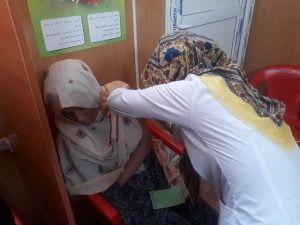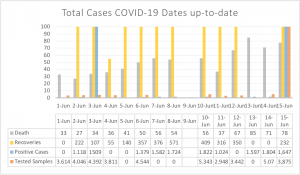Bi-weekly Situation Report
No. 11 (June 01, 2021 – June 15, 2021)

Civil Society and Human Rights Network
 Purpose:
Purpose:
This bi-weekly report describes the updates and challenges related to the government’s relief response program, known as Dastarkhan-e-Meli, and health assistance in combating Covid-19 in Afghanistan.
Time Coverage: The report covers all the measures undertaken from June 01 to June 15, 2021, by the government in Afghanistan concerning health and humanitarian assistance during the Covid-19 pandemic.
Situation Overview:
- Covid-19 New Update: The third wave of the Covid-19 pandemic put in place tremendous health crises. The positive cases and death toll are on the rise while health services are limited. The health institutions and hospitals are suffering from poor facilities and mismanagement, undermining the efforts to mitigate the effects of the pandemic across the provinces. The graph below shows the rising Covid-19 positive tests and loses during the first half of June 2021 across Afghanistan. However, due to lack of data and documentation, the actual number is expected to be much higher.

Amidst the third wave of the pandemic, people in most provinces are suffering from poor health services. According to CSHRN’s findings, residents in Paktia, Bamyan, Takhar, and Ghor provinces have limited access to oxygen, face poor health sanitation, and inadequate medical workers across Covid-19 hospitals. For example, in Covid-19 hospitals in Bamyan province, there are only 10 nurses, 10 vaccinators, and 20 beds available for patients, which cannot meet the growing needs of the people. CSHRN’s focal point in Bamyan communicated the problem with the provincial authorities, as a result of which 20 more beds were provided to the hospitals.
In Ghor province, people face with lack of oxygen, and inadequate health staff across the Covid-19 hospital in this province. On February 5, 2021, the Covid-19 hospital in Ghor province got fire and a large part of its health facilities were destroyed. And now, people are complaining about the slow-reconstruction of the hospital to deliver health services. In addition, the hospital does not have a separate ward for treating Covid-19 patients, and people of different health problems are treated in one hospital. While people in Paktia face with poor sanitation across Covid-19 hospitals in this province. A large number of infected people come from the Chamkanai and Zurmat districts of Paktia, bordering with Pakistan. According to CSHRN’s focal point, more people have been infected with Covid-19 when they traveled back and forth between the two borders to visit their relatives during the Eid-ul-Fetir.
- Challenges in implementation of Datarkhan-e-Melli:
In most provinces including Helmand, Nimroz, Logar, and Paktia, Dastarkhane-e-Melli has been suspended due to growing security threats. For example, in Logar province, the Taliban threatened the Rural Development Department (RDD), responsible for implementing the relief program. On June 5, 2021, while distributing food items to poor households, two employees of RDD have been arrested in Khushi district and were taken to an unknown location by the Taliban. According to CSHRN’s findings, the Taliban demanded around 10% of Dastarkhan-e-Melli budget in each district of Logar to be given to the group.
While in other provinces, the program is suspended simply because of lack of budget and have requested the government to transfer money to implement the relief package.